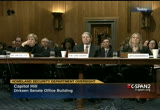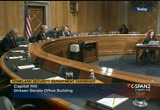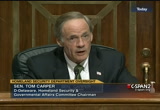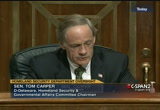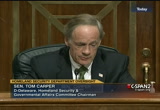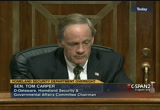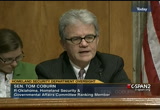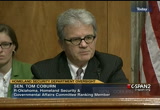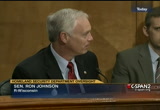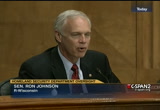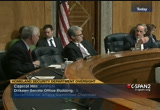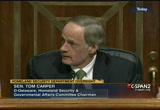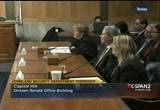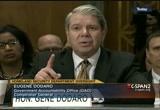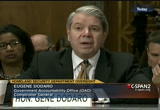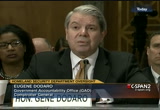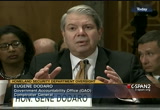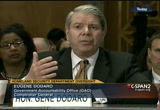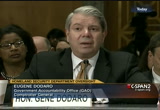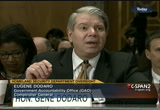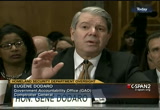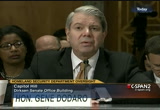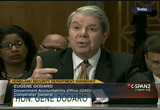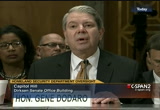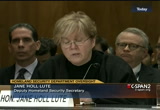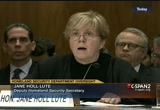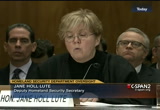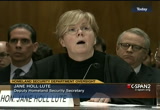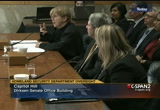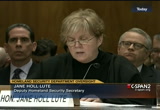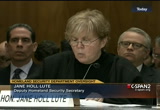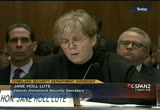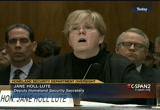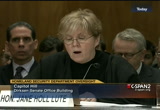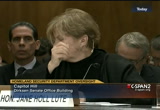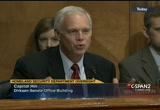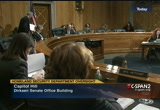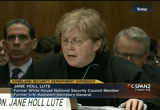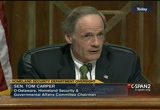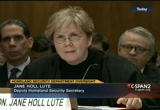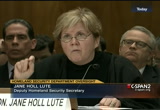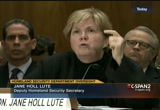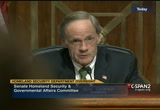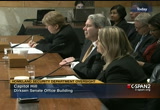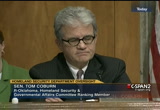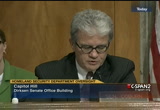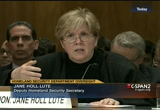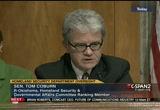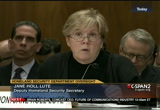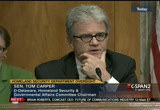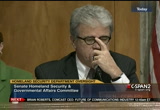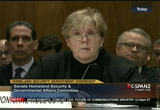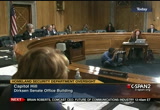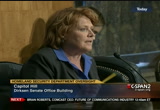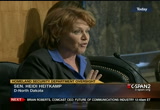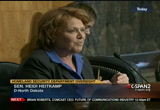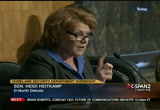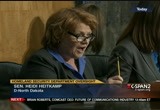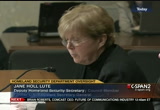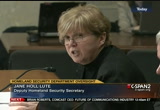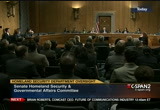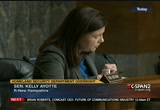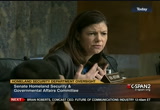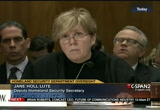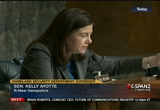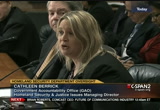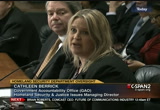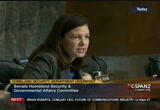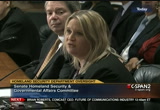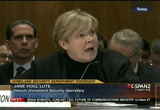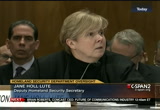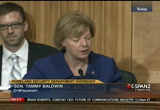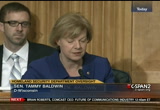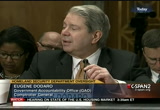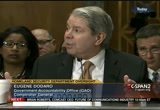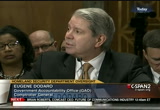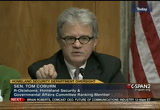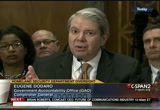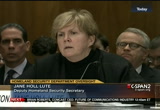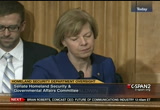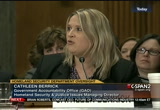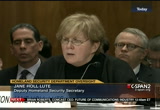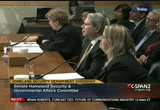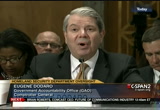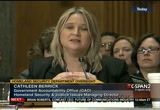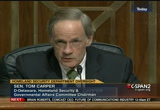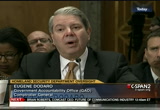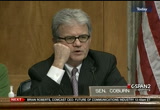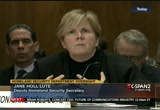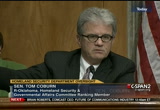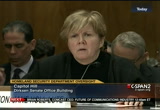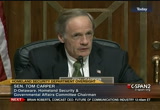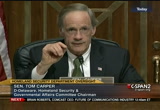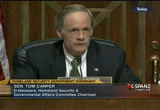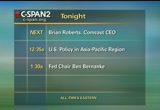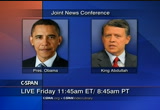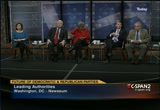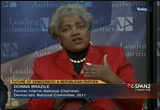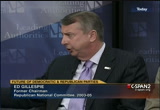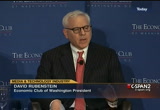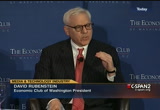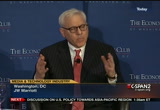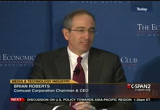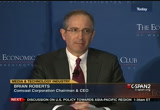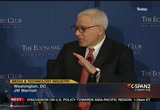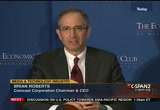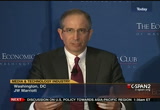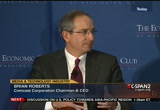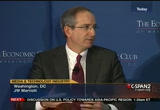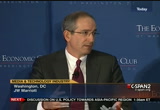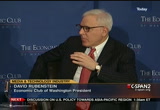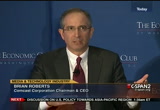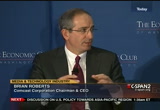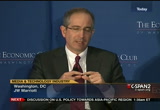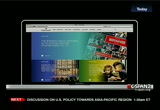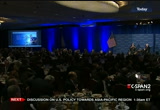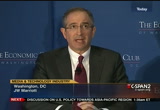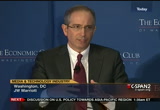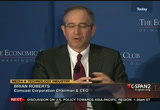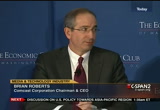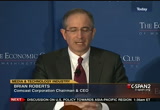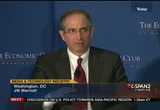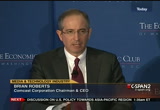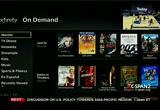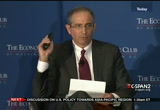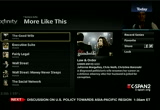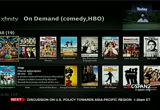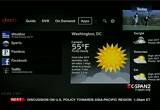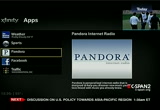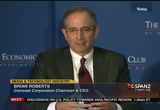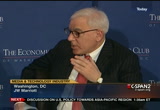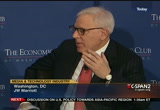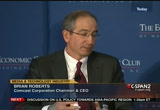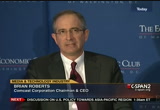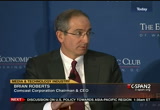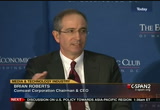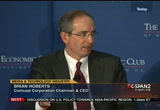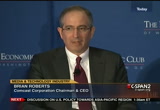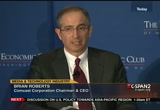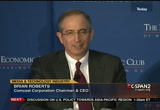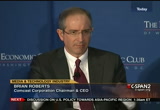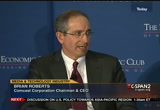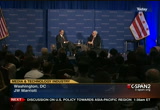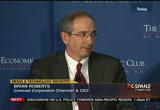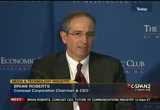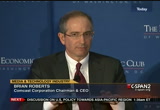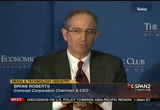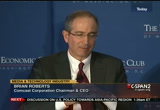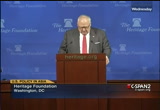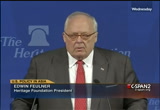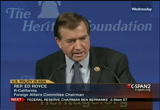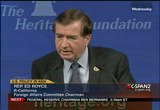tv Capital News Today CSPAN March 21, 2013 11:00pm-2:00am EDT
11:00 pm
they readily acknowledge the risk being made. like other eationzs, the department has grappled with a number of issues related to acquisition, financial management, and human capital among others. like some of the other agencies, dhs is immediating the needle. as we know, sound and effective management practices are critical to the department's ability to carry out the homeland security responsibility. weather talking about cybersecurity, border protection, disaster response or any of the other missions. as we look back on the past decade, i think it's important remember the circumstance in which the department was stood up. the homeland security act passed by congress to create the department was signed in to law november 25th, 2002. the department opened the doors on march 1st, 2003. so in just over four months 22 different agencies across the
11:01 pm
government with different culture were merged to a new department. in the early days at the department, the focus of both the administration and congress was moving quickly to prevent another 9/11-type attack on the homeland. management took a backseat to the effort. the dhs confirmed the fact when he testified before the committee last year. the management got shortchanged in the early days. it's taken years to dig out but the lack of the strong foundation left. that said, i want to give credit where credit is due. gao's recent report confirms there's considerable progress at the department. and integrating the departments and overlaying the component. the latest high-risk report includes fair amount of good news. because gao acknowledges the
11:02 pm
progress and narrowed the area on the high-risk list. the department deserves credit for the detailed plan to address all of gao's concerns and high-risk report, which i believe is unique among all the agencies on the high-risk list. i want to briefly review the improvements. in doing so i agree with gao permitted leadership of dhs has been critical to bribing progress in the east areas. the department is on the doorstep of having a clean financial audit for the first time. last year the department was able to get the financial systems in good enough order to attempt a full financial audit. that was a major milestone. that leaves the important goal of passing financial audit. i know, that the secretary of the deputy secretary of the team are preparing to make the final push. they are successful a major achievement. some of you are talking about a friend of mine asking how he's
11:03 pm
doing. compared what? the department of defense, we love them. they were stood up 65 years ago. they have not passed a clean financial audit. here we are an agency ten years complex knocking on the door. seat good sample so you can get it done for the brothers and sisters at dod. the secretary is committed to getting it done for them too. the when -- dhs was stood up ten years ago. there was no framework for accountability. there was also no guidance on which responsibilities with headquarter, which responsibility lay with the various component that make up the department, whatever that kind of environment, -- whatever the kind of environment exists in government a lot of wasteful spending and ine fresh sei. there was. the department made clear who was in charge of what. the new or disciplined environment will better enable the -- ensure that all of the
11:04 pm
operate more cohe'sive and effective agency. they used to have a dismal record when it came to contracts without competition. the departmental leadership has been aggressive in turning the record around. last month a report showed a spending on noncompetitive contract of fiscal year 2012 fell by 90% from 2008. that leaves about $3 billion in contract dollars, that previously spent without competition, now being spend in a manner that gets better value for taxpayers' dollar. competing contracts now that most other agencies. the department is also revamped the process for identifying technological solution at border. they moved away from the model which was contract to a single company to build a virtual fence across the southern border. an effort that went forward
11:05 pm
without identifying what the border patrol needed. they didn't deliver the capability promised. the department implementing more rigorous process to identify needs of sector by sector. it's possible to use commercially available technology to drive down cost and enable the border patrol agencies to become ever more effective. in the area of information technology, the department is now at the forefront of federal government earths to consolidate can that centers and move services. the effort to save money enabled department's employees to achieve better results. finally, there's no doubt that the response hurricane sandy -- we had a hearing yesterday on this. the response to hurricane sandy shows how much fema has improved since hurricane can katrina struck the gulf region in 2005. simply put, it would not have been possible without the better management. when katrina hit fema didn't
11:06 pm
have the necessary contracts in place to get the -- fema was prebared for prepared for hurricane sandy. these are all significant achievement. our witnesses will discuss for us today other examples. but i don't want to whitewash the serious remaining challenges with dhs management that remain on the high-risk list. department still has work to do. we know that. as both the controller general and deputy secretary luke will discuss. as i like to say the improvement on the construction and my colleagues heard me say a million times everything i do i know i can do better. the same is true for all of us and the department. for example, the department still doesn't have a comprehensive financial management system that gives the secretary time visible over the spending of 22 department component. dhs remains the lowest of all major department. i don't think that's going the
11:07 pm
case for longer. major acquisitions have exceeded cost estimate. the hearing provides a timely opportunity to discuss the possible impact fiscal year 2013, full year contending resolution on the department. i'm concerned about the $3 million cut dhs management and secretary's office will take under the bill. i want to hear from the witnesses today about the likely impact of the cut. i'm concerned that the level of funding for consolidation on the department is insufficient to support the next phase bringing leadership and opposition centered to one location and realize inefficiency and effectivenesses. the administration and congress needs to work together to resolve the high-risk area. we will. i welcome our witnesses today. we look forward to working with you. we need dedicated people like you so when in two years when they release the high-risk list we are sitting here.
11:08 pm
we might be in different seats, you never know. [laughter] tom said from my lips to god's ears. two years from now, when we're sitting here talking about the gao high-risk list, management challenges facing it. we hope they are off the list. the floor is yours. i'm going call on -- i'm going it scwu to say something before you leave. >> i would like for my opening statement to be made part of the record. >> got it. >> grs recently put out a memo by john reece about the definition of homeland security. the organization that doesn't know is going flounder in certain areas.
11:09 pm
we made it an all hazard risk prevention risk agency which is a possibility. you can't eliminate all risk. nor even if we could, we couldn't afford to. i look forward to all of your comments today and have frank discussions. senator carper and i over the next four years will oversite every corner of homeland security for the transparency that needs to be there, and also to see the improvement. and i appreciate his cooperation. and his leadership in doing so. i think it's healthy for you all and certainly healthy for the congress. we make a lot of decisions and a lot of times without the input that we need to have from the agencies, and getting to know what you do and how do you it and understand that better can help us as we direct funds. so i'm thankful for your work,
11:10 pm
i'm thankful your dedicated service. >> thank you, sir. senator johnson. >> mr. chairman, i wasn't prepared. ly take the opportunity, first of all, to certainly voice my gratitude for senators for way you're conducting the committee in the future. i think it's a good sign we're going try to reauthorize this department. the department of homeland security should be playing a vital role in the security of the nation. we are facing incredibly serious threats. i'm always concerned since i came here a couple of years ago was it really the right move? , i mean, you have -- yms you take 22 different agencies trying to begin them to -- combine them to one. the layer of obamacare is not the most e if i had time to ask questions, the one question i've always had
11:11 pm
it's about a $50 billion year agency, defense department about $600 billion a year agency. walmart, exxonmobil about $450 billion year companies. they get audited every year. $50 billion company, you know, it starts up, it gets audited every year. did doesn't seem to have much of a problem doing so. i've been scratching my head wondering why can't the department of defense, why can't the department of homeland security pass an audit? so i guess i would look to private business practicing and take a look at you know what is different in government that prevents that type of accountability? because the only way that department of home land security is going to be able to fulfill the important mission is through an accountable, efficient, effective management style. and i don't know how you can obtain that accountability if you can't pass a basic audit
11:12 pm
that private industry businesses that size do all the time. by the way, the management of those companies don't pass an audit they go jail or certainly face criminal charges. so i think we need bring that type of dedication, those types of private sector discipline to government to make sure that we are audible, efficient, and effective. thank you, mr. chairman. >> that's a great point. the 22 different agencies were jammed together it's different accounting system. it's not easy. and sixty five years later the department of defense is struggling still. i think there's two keys, one we'll talk about today is leadership. it's leadership. and from the department of defense and leon panetta and chuck hague l saying we have to get it done. we have to make it a priority. janet napolitano and deputy secretary, and other thing is
11:13 pm
our responsibility. we're working with g.i. o saying it's a priority. we're holding the hearings and doing the job in oversight until we can achieve it this. to their credit, they're coming. it's like turn the aircraft carrier. they are coming. hopefully the aircraft carrier they are returning that too and hopefully singing their praise as well. >> my point isn't being critical. but encouraging in the direction we have to go. again, i'm highly encouraged what the committee set out do here. i think it's the right path we're on. again, i want to be encorn couraging. >> it comes out of the private sector. they done a number of things. we can't measure or manage. thank you for being on the committee. you are a good addition to the committee. having said that, quickly introduce our witnesses. first panel includes not two but
11:14 pm
three impressive public servants. the honorable jane luke. and deputy secretary of homeland security and controller general. kathleen of gao. not here to testify but field tough questions. -- i think deputy secretary orderly is a matter of protocol the committee is you to be the leadoff hitter. if you are willing do this, i think it might make sense for them to set the stage for us by providing a little bit of broad overview and context of the
11:15 pm
high-risk series and the summary how high-risk relates to specific subject of our hearing management of the department of homeland security. if you're comfortable with that, we'll just ask him to lead off. we can move around the bases. you're recognized. thank you, thank you all. >> thank you, mr. chairman. dr. coburn, ranking beb -- members, senator johnson, it's a pleasure to be here to talk about the high-risk update. as you point out, we've been doing this at the beginning of each new congress since 1990. this past year, we provided the update recently. i'm pleased that the committee already held hearings on two areas under height risk list postal service, financial condition and cybersecurity area and considering legislation which is necessary to get those items off the list. in many cases, it's the a,'s actions that are required but a
11:16 pm
number of areas that are high-risk is really also up to the congress to pass legislation. now we have reported this year notable progress in most of the areas thirty of them on the high-risk list, this is a very good two-year interim report by standards. there's a lot of effort going to the areas, and i would credit this because congress has passed several pieces of legislation that are important of getting areas off the list, the agencies have worked hard and the office of management budget has worked with gao and the agencies to compete in meet -- convene meetings focus on high-risk areas. two of the areas we noted enough progress we -- removed them from the list. one is interagency contracting. we put that in 2005, that's a good practice for agencies if implemented properly. we find that we're doing it without a scope rules and
11:17 pm
responsibilities weren't clear. probably the most notable example when interrogators were ired for iraq. the clearly kneaded to be -- needed to be changes. congressional direction, the federal acquisition regulation was changed and requiring the best approach. which required documentation that the decisions written agreements on spelling out rules and responsibilities. also at congress' urging and direction there was a requirement added for business case 0 developed and approve before new interagency contracts could be put in place. congress asked for a series of audit by the department of defense about inspector general found less problems over time. we were satisfied that the mechanism in place, there's demonstrated progress and removed them from the list. the other is the irs business
11:18 pm
systems modernization. we put that on the list in 1995. irs was monitored in technical management weaknesses with the system. over the years they made steady improvement. they required an expenditure plan from irs which gao is required to review. the irs has made measurable progress they installed the first module of the new system which allows for daily updated of taxpayer account. it's a huge change. it enables refunds to get out faster, and send notices faster and field questions and help in enforcement area. they have institutedded about 80% of all of the best practices for i.t. investment management, and 100% of those best practices for project management. it's a notable achievement. they have been rated their software acquisition department at the computer model three
11:19 pm
level by the software engineering institute standards. by industry standards it's a good mark. for both of the areas, a point you make, mr. chairman, in your opening statement, you touched upon the importance of congressional oversights. they had sustained congressional oversight over the period of time, and good leadership by the agencies. those are two key ingredients. virtually every area taken off the list and taken a third of them over the years have been attributable to those two ingredients in place. we have also -- while they are off the list, they are not out of sight. they continue to monitor what is going on to make sure that the progress is sustained. we also -- modernizing the regulatory system for the united to include there the management
11:20 pm
financial management problems fralg housing administration. they below the capital requirement needed. they took on more risky loans during the recession their period where the private sector backed out of the mortgage market. we want to highlight the changes, also as congress resolves, the conservativeship of fannie and freddie, you need take in to account the federal implications for the housing administration. it needs to be an integrated -- it's what the proper role should be. and the federal housing mortgage market. we added two areas to the list this year as well. the first was limiting the federal government's fiscal exposure by better managing climate change risk. this area very concerned and the financial risk. federal government owns hundreds of thousands of property, many defense installations along the coastal outline, 29 federal
11:21 pm
government owns 29% of the land. federal government runs two of the largest insurance programs. there are flood insurance program flood insurance already owes $20 billion. hasn't made payment on the debt since 2010. the levels have just been raised to allow them to borrow additional money to help out in hurricane sandy. congress passed legislation recently. it's needs to be implemented effectively. and also the disaster aid that is provided, criteria for providing disaster aid hasn't been changed since it was established in 1980. right now it's $1.25 35* per person per state. it wasn't adjusted for inflation for a 13-period of time. we estimated it the federal
11:22 pm
government would not have been involved in 25% of the debt and disaster declarations put in place over time. we also don't budget for major disasters. which is a real problem for particularly given our precarious financial situation right now. the only thing budgeted for is five-year historical averages of disaster under $500 million. so virtually the tens of billions of dollars that have been appropriated over the years, in the last decade, about $14 0 billion well over 80% of that. almost 89% has come through supplemental appropriations. we have many idea for improvement in the area. it's important. it's also related to the last area that we added to the high-risk list which is a gap in environmental satellite. the polar orbiting satellite in particular provide global
11:23 pm
coverage of the surface of the earth twice a day, morning, afternoon, and evening orbit. this data feeds the weather prediction model for three, four, and seven-day forecast. because of procurement management problem over the years there's a gap anywhere from 17 to 53 months where we may not have the information. it's critical -- if we have not had the satellite data hurricane sandy they predicted it to go out to sea and not hit new jersey. it wouldn't have been adequate warnings for the residences. we have encouraged noah, dod to put contingency plans in place. they need to be properly executed. it's an area for congressional oversight to make sure the gaps do not create real problems that can lead to loss of life, property, and other economic
11:24 pm
damages over time. we also narrowed the areas for three of the high-risk areas including the department of homeland security, and we found that over the years the initial implementation of the department, they created the national response framework for disaster systems. they have hired, produced, and have in place work forces. they stood up new agencies with communication intergracious center. we felt comfortable getting them to the management challenges. most of them you highlighted some of the major progress that's been made. there's been progress there. there needs to be additional progress. they need to get a clean audit opinion for two years to get off the gao list. you need financial systems in place. major aqua situations are overrunning costs, and not being delivered on time with the
11:25 pm
expected type of product that is needed to execute the mission. there are many other areas. we identified thirty one specific actions that need to be address and come off the list. the department fully addressed six. mostly address sixteen partially and seven they initiated action. that provides a score card. they have an excellent road map now. they need execute it. we're committed, i think we had a very good constructive dialogue and partnership with dhs to provide clarity. they stepped up and have plans in place how to do it. if they execute the plans i think they'll continue to make excellent progress. i thank you for the opportunity to be here today. i would be happy to answer questions once the deputy secretary provides her statement. >> thank you very much for the overview and for the specific on the department. and for being a good partner with us. as we try to help dhs do the
11:26 pm
better the work they already do. secretary, you are on. welcome, glad to see you. >> thank you very much, mr. chairman. ranking member, coburn, good see you again. distinguish member of the committee i'm grateful to be appear before you today. our ten year anniversary provides an important opportunity consider how dhs has evolved to fulfill the original purpose and reflect on work to be done to realize the full potential. i don't know, dr. coburn, he's behind in the reading. i'm not a politician, i'm not a diplomat. i spend a long time as a soldier, i'm an operator. i run things. i describe the mission of homeland security in simple terms. our job is as part of the federal government is to help create a safe, secure, resilient place where the american way of life can thrive. in order to meet the job and fulfill the mission we focus on
11:27 pm
five main things. preventing terrorism, enhancing security, securing and managers or borders, administrating and enforcing the immigration laws, ensuring the cybersecurity, and building national resilience. we don't do any of it alone. dhs plays an important role, we view homeland security as a whole community effort. therefore, rely heavily on many partners throughout the homeland security enterprise that the state, local, triable, territorial level across the rest was federal government in private sector and among the american people. in turn our partners including congress in this committee, which we have appreciated over the course of our lifetime. it is the reason the department is ten years old. and not one year old for the tenth time. there's a big difference. we have made progress over the course of the past ten years. we continue -- we intend to continue making progress. but this committee, in fact the american people have a right to expect we can do three things.
11:28 pm
they have a right to expect question execute the missions i outlined for you. they have a right to expect that we can run ourself. they have a right to expect we can account for the resources that have been entrusted to us. we expect no less of ourself. it was is in the nature composition and purpose and operational department. yes, we have policy making responsibility. we have regulatory responsibilities we have operational responsibilities as well. every single day tens of thousands of homeland security professionals provide essential service to the american public from securing the borders to processing immigration benefit, responding to disasterrers, patrolling the nation's water, safe guarding the air travel, and countless other ways. to carry out the mission we must be able to recruit, hire, and retained qualified staff. budget account and oversee billions in financial resources. procure complex systems and service, collect data, maintain 24-hour communications
11:29 pm
situational awareness. ensure appropriate security and safety and manage the hundreds of facilities and location where the personnel are deployed. we do these things in homeland security every day and we do it for the american public. to do them we know we have to be well staffed, well trained, and well lead. to meet the requirement we work constantly to improve erg. as a result, for example to improve across the board time across the board since the first time since 2003 they earned a qualified audit opinion on all five of the ballot sheets. i project this year, mr. chairman, that we will have a clean audit opinion and perhaps we'll be able to achieve a clean audit opinion for two years. i don't need to tell the committee . >> i am going to repeat myself.
11:30 pm
from your lips to god's ears. >> thank you. i don't need to tell you what an exorder their achievement it has been. i would like to acknowledge my colleague from across the department who works to make it -- the lights are on in many buildings around washington, d.c., very light to the night so it can be achieved. we are proud of the people who have done it. we'll continue the fierce commitment to sound management practices and expect dhs will receive that unqualified audit opinion. we know the congress and gao understand the importance of effect i have management. when gao placed implementation on dhs on the high-risk list, in 2003, it cited three principle reasonses for doing so. the sheer size of the task with the number and complexity of transforming 22 agencies to one department.
11:31 pm
many of the agencies were coming to dhs with preexisting conditions. preexisting gao findings and other challenges. and third, because of the potential for catastrophic consequences should the effort to strengthen the security and safety of the country fail. the undertaking has been massive and many challenges have been present. there have been many advantages beginning with the men and women of the department. and the unwavering professionalism. similarly, in the early years, the leadership of dhs work to build a foundation for which to grow. and congress has -- has been great to the progress. with this help, we made considerable progress in all key areas of management. ..
11:32 pm
first, the homeland security search capacity for its created legislatively in 2006 requiring the volunteer force made of it dhs employees who could deploy an event of a catastrophic disaster support survivors. on november 1, 2012, the aftermath of hurricane sandy activate the search for the first time. within a few days nearly 1200 employees from homeland security
11:33 pm
came across the department. tsa can the cbp, coast guard, secret service and teachers for quarters. these individuals communicated directly with disaster survivors re: power restoration, emergency service is, how to measure for disaster assistance that they set out ships dock of short said there would be close to people they serve to not take up limited space. they empower those by the storm. they were at their best for people who had been through the worst. a second example of the things we can do today that we cannot do 10 years ago a cybersecurity. people didn't talk about in the terms they talk about now. by bringing components and homeland security together we been able to formulate a coherent strategy to defend the federal networks, engage a broad security expertise of one person
11:34 pm
to the durkheim intelligence communities to strain the protection of resilient of the nation's critical infrastructure, the cyberand physical. the point of these anecdotes is not just communities bounce back from disaster or architect from the ground up irresponsible approach to cybersecurity. the point is the very best of what the department is about comes from the work we did together in the individuals transform the department for 23 separate agencies into one cohesive mission driven unit whose purpose is to help create a safe, secure result in place for a of life. from a management perspective as well, we continue to streamline industry at ourselves. the secretary reviews began four years ago have led to dhs employees identifying for device specific projects and initiatives that appeal to for the $4 billion across the word. savings reinvested into our critical mission.
11:35 pm
alastair has yet noted, we've consolidated data centers, overhauled procurement systems, written the federal government's first-ever guidelines on financial assistance to create clear measurable performance objectives, built a compendium of operations and homeland security to give his disability into the indicators and metrics for performance that we have to become more visible. we know our work isn't done. we know nothing stands still. threats continue to evolve. technology what dance and operational demands will continue to grow. we are deeply connected to disrobing committed to doing our best to ensure this country remain safely secured a place with the american way of life.
11:36 pm
11:37 pm
somewhere else in the part of the department? is there any restructuring in hindsight or do you think things are pretty welcome price here? >> thank you, senator. i don't have too many organizational theologies. you can always see things differently to make improvements, but if you ask any 22 agencies, legacies and offices, can they find themselves in the mission statement and say securely sign a place in the five mission preventing terrorism, borders, immigration, server security? yes they can. largely for the most part are in the right place. >> can you describe the major reason that hasn't been achievable? content from palatability of 22 different agent is quite what has prevented a complete audit?
11:38 pm
>> would make progress over every year. at the moment were focused on property and will be able to resolve for 12. the >> the complexity of individual issues as opposed to being able to account for all the plan the federal government operate in the jurisdiction quick >> is a tremendous challenge. it's not the rid him of the tools to do it. it is a chinese challenge and not that we lack the commitment or the help and support of partners. we have other things people get this done. >> number of things you account for take it all quite >> it's a big job. >> thank you, mr. chairman. >> thank you for sticking with us to ask those questions. let me start with a question if i could for the deputy secretary. but they focus a few minutes on the next step of the departments taken to improve management of the department.
11:39 pm
to independently evaluate the sustainability of the management of pertinent that have already been made. how we do that? also what reports will be available to his committee so they can monitor the progress occurring to meet our responsibilities? >> thank you, chairman. we've done several things. one is to launch the management health initiative designed to create a dashboard for the adequate performances. in addition as they mention, we have for the first time begun to compile a compendium to give his disability into all the resources we have been the department and how they are played against those nations. building this kind of business intelligence and understanding of operations is fundamental to be able to report in an authoritatively on the
11:40 pm
accomplishment and achievement made. we look forward to working with the committee to establish regularize reporting to give you visibility we have. >> we all know management manners. good management in which agencies and businesses execute missions. i hope one of the missions the concept is that management manners and i'm convinced we have good management. i also have some continuity. i think nobody's perfect. but she's a very good administrator and i think the factions going to be staying around hopefully for four more years and i hope to be staying around at least that long. i think over your right shoulder, is that the man?
11:41 pm
brasil is the undersecretary of management. a lot of what we're talking about has led to mention not only with to acknowledge him. thanks so much. deputy secretary, which he provided us with just a couple of concrete examples were weak management is undermining performance of the department and conversely burket management has enabled the department to better carry out its mission? a couple of good examples were bad management undermined or it's just the opposite is true. >> thank you, mr. chairman. airfield now make may come your not to be secretary -- she's a terrific century later. >> the chairman here is not perfect.
11:42 pm
i've known the senator for the time. as good as she is, she's not perfect. >> leadership and management are instead paid a lot of attention to over the course of 35 years of working in the public sector and the international civil service and the not-for-profit sector as well. what management is to do clearly is prevent people purpose and pride. you don't run organization with putting people down. you've got to say clearly what is our job? what we try to do in the department of homeland security four years ago i stood in the door jam up one of my colleagues and sent me to narrate the purpose of this department in very clear terms. we need to connect a bottom-up review of opera doing a balance that examination against what they said is important to do. we need to get off the gao high risk list and become auditable.
11:43 pm
those are the examples we've made progress in every single one of those areas. when you're creating a new department enterprise, done this several times the private sector. this generation of purposes really essentials essential people understand what they have been doing that contributes to perfect their being asked to perform. it's easy sometimes particularly at the operational level to assure the day today and takes a great deal of effort to develop respect to a strategic understanding of how those indiscreet efforts add up for an overarching purpose. narrating a purpose of homeland security, clarifying areas as we have done, orienting people the direction of performing this mission, tincher being too running ourselves, tincher meeting to public accountability? if whatever you're doing is not one of those buckets, start doing it.
11:44 pm
it is a particular leadership challenge when you're doing started. one we have in establishing this department. >> one more if i could. secretary lute, working on a continuing resolution to fund their fiscal government -- fiscal cliff, you know emergency to emergency. do you think you appeal it to sustain or improve upon the vital management privacy in the past five years? the senate version of the fiscal year continuing resolution passed yesterday in the senate cuts about $17 million for the department management functions. tell us what could be the practical impact of reduction of four example to put in jeopardy
11:45 pm
the department's ability to rigorous reviews, components and acquisitions the gao recommend. >> you don't run operational departments at the ability to hire can retain and manage people with the ability to require and procure goods and services without the ability to render financial system from accountability point of view. all of those will be affect to buy things that may take longer. there may be aspects for no good as thoroughly as we would like. our job is to limit any negative effects and prioritize the leadership jump. >> already. dr. coburn, please proceed. >> secretary lute, i know you know i appreciate your work. i hope you're somebody say around two year the paper. i think it's unfortunate you haven't read it.
11:46 pm
it is published january 8th. the fact is there significant criticisms you need to be aware of rather than to dismiss them, especially since it sounds like you or your staff how to his scholarship. i hope you hear his test dummy about what his research shows in his criticisms and then give this man other. [inaudible] >> you did? the thing is totally off base? >> i disagree with what he finds. i do think we know how to orient termination for that purpose. >> okay. that's fair. one of the things a number of recommendations made by the 9/11 commission and that's a fairly remote commission. one is the status of tsa's effort on explosives and now just i cannot date of where we
11:47 pm
are and where you're going to be on that requirement. the other requirement they had some big u.s. visit program. gao found 825 of data not much matched to the correct fingerprint. they might be fraudulent and rate others no way to determine. you don't have to answer these now. i don't expect each know the details and understand that, but to me those represent two areas where it has substantive recommendations by the 9/11 commission that we've not achieve the goal. both are significantly important to the missions of your organization. i hope you respond to me and not. since 2004, your agents he has
11:48 pm
dispersed $35 billion grant. what do you know about the effectiveness of the accomplishments of those grand? >> thank you, dr. coburn. we don't have the granular visibility into the accomplishments we want to have. we do now that we have created a great deal of capability across the country must grant and we do now there is a need for a comprehensive approach to a financial assistance of the federal government in our case provide. we've written not approach to financial is distant. we've taken a look at everything from understanding requirement in the correct making area come out to build and work with communities at the state level and local level in constructing well-written brief proposals. with the that the accountability
11:49 pm
and ratio personnel to oversight. we begun to make progress to the financial assistance work under the direction of our cfo. >> do you think fema at the very these should track what graham is spent on? >> yes, sir, i do. are you? >> not as well as i would like but we are improving. >> gao found other 10% of acquisition programs fully comply with the nuanced position policy and i know this is a work in process, so not actually been critical when i make that no. i know your intent to impose to accomplish that you fails about one third of the programs that should have had approved acquisition baseline actually do. the baseline for probably the most important tools for managing individual programs and
11:50 pm
connecting congressional oversight. having said that, what steps are you taking to hold accountable acquisition policy? i made that the policy in. i was the management accountability to make sure the agencies are holding within the acquisition policy? >> as you noted, we have drawn program center management direct give 102. each programs submit to the acquisition review board decisions are taken. the questions from accountability are in line. we have instituted a vice management cycle model which we are imposing on which i programs , for not performing. we begun to change the culture. we've come a long way. it's a noble leave it undertake a careful review of a requirement are in exposing those requirements choose the
11:51 pm
process. >> how about the acquisitions before you get started? >> some have heard unproblematic and all of them incorporate into their process. >> would you submit to the committee the ones you terminated and the ones that are? >> yes. >> thank you. my first training assassinate count and and auditor and i can tell you the next. when i type humoring cap in some kernels today, they are so thankful the marine corps is just about to pass an audit because when it's actually done is make their job easier and decision-making easier because they have visibility on the key parameters, which we judge the outcome of a decision or direct them to make a new decision. are your people ready to use
11:52 pm
accounting information to make management decisions of the wetherall 22 agencies? >> that's a great question, dr. coburn. the answer is absolutely. if i could call it the men and women of the coast guard. to achieve auditable status. this is something we have in the commandant and the leadership has pushed down to the lowest level possible. the american people have a right to expect they can account for resources given to us and when you can do at its very powerful from a leadership point of view. >> let me ask you another question. you've accomplished and performed about 60% of the gao recommendations. i don't expect you to say they are right and every indication. i understand sometimes they miss it. but 40% have enacted on.
11:53 pm
are some of those recommendations you disagree with? or just once harder to implement and is very pushing senior management and dhs to accomplish and meet those recommended accomplishments? >> there absolutely is a push. as mr. dodaro mentioned, this is not the first time we sat together. we made a commitment early on to get this right. there's a few things we don't agree with, but we have an overwhelming bandwidth of agreement between us, what needs to be done. >> were you sending in the committee which you don't have it? >> whatever material we have we can share. >> use of recommendations. so not to us because we read gao reports in my office and would love to have the other side of
11:54 pm
the issue for you think they disagree. final arbiter of the u.s. congress of making judgment on this thing and whether some men will put an appropriation bill to make you do something you disagree with and have a good reason for saying we think gao counterpart. i'm sorry for interrupting. >> i just going to conclude he is seen from a detailed plan for working through the finding that given us. the only way i know is an operator to know what we need to do. >> i'm over my time. >> what he just said disagreed with most of the recommendations, but not all. make him become a member of this committee has shared with us in a number of times thing because the 8020 rule when they were leaving the committee.
11:55 pm
they agreed on 80% of the stuff for 20% of the issues. we decided to focus on the 80% we agreed on and set the other 20% decide to look at another day. i think that what you're doing here and whatever you're doing is working, keep it up. >> senator ayotte is next. we're going to go do some other heitkamp. senator heitkamp, you're recognized. >> thank you so much, mr. chairman and thank you for appearing today. i do know janet be well and she's not perfect. tell her i said that. during my time in public life and been a tax auditor, tax commissioner, said this is an area on how difficult it is and
11:56 pm
how difficult it is to make up every day and whether you're primary mission is to protect people. we are held accountable for how we do it and we are in a time of tight budget questions. when we have 10 years or we aren't able to pass audit, it gets increasingly difficult to justify to the american public that we are doing the right thing here. i'm new to this and i can tell you i sat through 10 hearings like this on a gao audited a tougher. i want to give you an example of why the american public is frustrated. recently in north dakota you guys remixed three full-body scanners to move to other locations to replace scanners that she had to replace because they did not pass privacy measures.
11:57 pm
by now, north dakota is a place of great economic growth. in fact, their airport is experiencing a 49% increase in passengers. we have more airlines flying in there. the airport is understaffed, yet you remove the scanner causing people to think okay, here we go again. they can't seem to get it right in washington. they can't seem to get procurement rate. we see it every day and obviously we're grateful for the help weavers need from fema and all but true compassion and caring the people experience. people can like the federal employees who show up in yes you guys can sleep on chips and demonstrate willingness to be accountable, that people want
11:58 pm
their dollars spent and unaccountable and efficient manner. their tax dollars. when we see repeated problems and a lack of what we've been hearing today, 60% you can agree with, theaters and a lack of years and i can tell you estimations be a second back year after year by not having responded to concerns and questions that probably wouldn't have gotten a region the next time in the legislature would've taken away my response ability. i have a couple questions about scanners and i know in the grand scheme to this is not the big issue, that illustrates concerns i have about defending the federal government when we go home. i've been told by john sanders
11:59 pm
the agency is developing an acquisition ready for the scanners that will replace the systems transferred out of our airport. the critical acquisition program will impact the safety and security of mike shubin. what steps his dhs and tsa management taking to ensure that the acquisition problem identified by gao such as lack of a plan to manage and measure performance that repeated. i have to tell you it's pretty tough when i talked with john because i said look, the next enhanced you have the same scanners in north dakota. i love 400 constituent letters about the waste of time. you've got to figure out how you can do this in a way that doesn't disrupt. the notice was way too short but there wasn't the ability to
12:00 am
adapt. i use this as frustration and want to be supportive and want to learn more about what challenges are admitting policies, but i also want you to know that i'm deeply about your regulators and inefficient is in the response is for working on and hoping what they are. >> senator, when i was in the army, one of the chiefs of staff, i'm a great admirer of his, hope is not a method. we're not hoping to get to a clean audit. we went hoping to get to a qualified audit. we are auditable in less than 10 years of existence for a $60 billion agency with half a million people. i share your determination at the accountability and auditability instability continues and has to approve.
12:01 am
>> if i could just make a point and it's not to be belligerent, but it illustrates that they've been consistently told the regulator after 10 or a, they would not give him 10 years to hit the mark. they would not have been given 10 years. i worked in a bank when i was younger. but i can tell you is we take a backseat to no one in our determination to achieve a clean audit opinion and i believe we will have got dark because i know the effort going into this. in terms of the acquisition be happy to share with you our management direct is two which now programs must adhere and it's a rigorous process that examines from requirements to ultimate disposition. >> not to belabor it, every
12:02 am
organization has a policy. the question is whether they have the will to the policy. these numbers at this point aren't numbers they can defend in north dakota. >> we also have a proven track record of holding meeting, kinston programs, in reading the accountability and understanding and overs within the department of acquisition programs and would be happy to lay all this out for you in as much detail as you would find useful. >> if you haven't taken advantage of this, i know senator coburn -- they spent a couple hours with me and my team and is enormously hope when you need where they were when i
12:03 am
restarted and what they need to do. roundtables are good and i would just encourage each take advantage of that and maybe we could have a small group of senators to have that conversation with stats, everybody would be better for it. >> senator al, thank you for being with us yesterday that today. you are a wreck is. >> thank you, mr. chairman. i want to thank the witnesses for being here and follow up on some questions you are already asked by senator coburn and may have been touched on by senator heitkamp as well. that is to grant programs in the acquisition programs. the 2012 gao report found that in fact found a major acquisition programs continue to cost more, take longer, deliver less capacity in a tent if i
12:04 am
programs are scheduled problems, 16 of which still increase cost of 19% and billion in 2008 to 52,000,002,011 and according to the december gao report, this is due to the lack of knowledge-based program management practices and i know that dr. coburn touched on that. but where are we on this and how do we basically a senator coburn said, if we can't continue to see cost overgrowth in a challenging fiscal climate, how do we justify to our constituents we should be spending money on these programs? can you help me where the rmi and i got to get some comments from you on that issue. >> thank you, senator. we agree we can do. this is something where very
12:05 am
seized the. one thing we did was put in the national preparedness goals. what do communities need to do? how much of x, y or z detainee to have? how do they know is that of judgments regarding what constitutes preparedness that they're getting close to that. articulating was an important first step. evaluating the capacity is a sizable investment in the compact to be something where i need to do as well and measure performance object is can't be begun the process of ourselves. in 2009 we had over 182 performance object is come to some of were impenetrable. they're difficult to understand for non-illustrates over. we've broken them down and cut them by more than half and put them in plain language cities are recognizable steps in the
12:06 am
direction of preparedness. >> can i share next errands when i was attorney general. the experience i had a nice day, good intentioned people, but a lot of specific requirements on the money that they be allowed a local agency to buy an atv or particular piece of equipment. as i thought, no connection to the overall plan to homeland security. where are we on the estate colors and what i've seen from a state to his equipment here and there, but i couldn't connect at either the state or country. >> i was part of the purpose of laying out national preparedness goals so not just because he was states are doing, but states
12:07 am
could further down and see what it's doing at local level. >> another escort me to some plan to protect the homeland? >> that are coordinated to address risks in a prioritized way. >> i appreciate that. i'm new to this committee but want to hear more about certainly like to hear your news. >> i think senators the blood captured the state of dhs's acquisition which is they have a good policy in place. the key is execution moving forward. our review we issued late 2012 identified mr. dhs major acquisition programs like key documentation in this fundamental to managing those programs. half of the programs didn't have that documentation that includes new programs that will programs as well.
12:08 am
dhs has a number of promising initiatives they are pursuing right now it will strengthen our acquisition function. the status is the early stages and i can give you a cup examples. one is they've developed requirement validation function which looks i requirement across the department and coordinate set to make sure they develop one dhs solution to meet needs. if you have positive but still in the early stages of starting to need as they move forward. another promising development is a dashboard to oversee cost schedule and performance, again very promising but that also was in the early stages and due to data issues, members can rely upon that right now to make decisions. there's absolutely nothing on in the right direction.
12:09 am
the key will be executing the, which is a good policy and assessing results as they move forward. >> thank you. the 2013 high-risk list, where the issues that fall under primarily dhs and of course the one that jumps out at a repetitive length the hearing on the cyberchallenging the sharing and managing information to protect homeland security is a key issue post 9/11. and where are we? still on the high-risk list. but every time you could to talk about here and where the major challenges that remain? obviously these things you can't share i understand not. >> the information sharing environment is the government structure to managed issue goes
12:10 am
down federal agent david would have key leadership in the area. there's some good oversight. the white house says other state committee and overseas offers an ambush his strategy was pretty good metrics. the key right now is the five major department that have key responsibilities including dhs to execute information sharing initiative and coordinate with one another. dhs is made parkerson this area. they prioritize information sharing initiatives. a key challenge they're facing with other department as well as resource initiatives. we think this work to do in leveraging departments and also identifying the resource needs for various initiatives still underway. another big challenge is the issue of connecting systems to
12:11 am
enable departments to share information. thurston frameworks put in place but the agencies are released teachers of that. very good progress to the key right now would be the department's responsibilities to the florida court made initiatives such as the i.t. initiatives in the together to address these challenges. >> i would just add one thing to what kathy has said in addition to all of that. there may be two to angst. when this sorting through the roses and import aspect as well. u.s. person, not u.s. persons, working through that with counterpart agencies and we think were making progress, but it's something they have to do pay attention to. the other thing would be done to come to grips with and i would
12:12 am
say this is a tremendous challenges the so-called big data challenge. we have several initiatives across the department of homeland security. i called the common redress in traveler assist in customer service. what we know is the right views with movements of goods. a million people cross our borders. we have each amended none of data. i've can minimize the collection of the data do not pose an undue burden on the traveling public and how do we share an expedited way subject to rules, protection for civil rights and civil liberties in the practice on although some. >> i know my time is over. thank you for the latitude of mr. chairman.
12:13 am
>> senator baldwin, good to see you. >> i want to also thank the chairman and ranking member for holding this iconography of the department of homeland security. clearly what was accomplished in 2003 was no easy task and i certainly recognize the incredible progress made is the department's creation. since were here today, i want to focus on a cup o. areas in which the department can improve. fortunately for me, senator ayotte's last question is the first question i was going to ask about in terms of recommendations in the gao high-risk report on sharing across agencies. i feel like you've tackled that. i want to also look at another
12:14 am
area. mr. dodaro, in your testimony you discuss the high-risk and 2013 limiting the fiscal exposure by better managing in the changer is. our country has certainly seen an increase in events that contributed to significant loss of life and property. they are more and more damaging than the level of involvement of the federal government is on the increase. one of the recommendations is for dhs to improve the criteria for assessing jurisdiction capability to respond to and recover from disaster without federal assistance and better apply lessons from past experience with when developing disaster cost estimate. a few weeks ago his meeting with
12:15 am
the county executive from one of the larger counties in the state of enemy if they discuss the need for feedback and other agencies to be involved in ensuring local communities are prepared for the worst. i wonder if both of you could comment on what dhs action items have occurred and will occur in the near future to assist local communities in preparing for the worst. >> first the criteria issue is a very important one. the criteria was established as the qualitative criteria, but use some quantitative measures. one is a per capita cost per person that started out as a talismanic teen 80s or persons per state is a threshold of
12:16 am
whether the total cost would go over that and get involved. i was not indexed for inflation for a 13 year period of time from 1986 to 1989. our calculations show that had been in fix the federal government would not have been involved in about 25% of yours that occurred in the past two years. fema did agree with reassessing criteria and said they were going to do it is a complicated task, but it's very important because of the incentives that provide at the state and local level to make their own plans for preparedness and reduce accountability lie. state and local governments has done in response abilities, so they have a lot to say in terms of our infrastructure is located. the other responsibility
12:17 am
feedback is to come up with criteria to determine readiness at the state and local level. this goes to the great question provided at what point even with jane mentioned our goals, at what point are states capable of responding to these situations. fema is still working on the issue and hasn't resolved the the issue as well. one is the criteria for whether the federal government conveyance or intervened in any to be reassessed. he has agreed, but it will be a while before they come up with criteria. second when fema comes up with criteria for determining readiness at the state and local level. both are needed to have good benchmarks on the area. >> what the senator yield? let me make a comment about
12:18 am
oklahoma. oklahoma versus 11 damages based on the ratio and it is to be a combination resources. it was one of those. now are happy to take the money. i never have and are state legislature. i would put us back into it. were going to spend it to spanish dollars worth of fear did we have in their scummy point in time for the local responsibility has to take over and be responsible for the legitimate function for a couple reasons. one is we cannot resolve and be totally prepared even if we were the great benevolent figure we are. never to come financially we can't do what we said we're going to do now. we have to change this number at
12:19 am
least for inflation because it featured in this advantage to a small state. we have less than 4 million people. it's not to give $4 million in oklahoma. how much responsibility? i would say the vast majority. i think your point is well made and i'm sorry interrupted you. throughout my time. but we have to start putting this into perspective. >> bakery, senator. a good interim measure would be to index for inflation or the entire period of time because fema has indicated it will take time a year to come up with new criteria and go through the vetting process. there could be changes they could consider. >> my understanding is first the
12:20 am
last dozen or so years the number has been in tax or rate of inflation. the first overseas? since it was not. i got the issue here and what kind of catch up with you. thank you for bearing with us. >> no problem. deputy secretary, i don't know if you have any comments on the salt though. >> it's not 6040. jean and i agree it's probably 9595. it's really on the basis of comments respect is the perceived. i guess the only thing i would add reflects on the point dr. coburn was making, which is in a tornado that went through chocolate not long ago, an extraordinary demonstration of local capacity.
12:21 am
no federal searches easier and a small tv example is the exact point they're making a nice bareheaded. >> the other question i had come to my home state of ben has a number ports of entry throughout the state that customs and border protection overseas. and i'm curious as to whether there's any major recommendations that directly involve customs and border protection and whether such recommendations focus on security at ports of entry. if we could both comment on that and provide context of whether the recurring issues for security at our ports of entry. >> yes, senator, i'll ask kathy to evaporate, but the one i know of is the transportation worker identification card issue, which
12:22 am
revert about in the status of that card and not having the card readers available yet. so that's been one problem, but i'll ask kathy to elaborate on others. >> in addition, i would shouldn't society disguised the u.s.a. this system is a mandate to develop a biometric capability to track people leaving the united states. they have a biometric entry system and that's a key area they are working on. another area determining technology and infrastructure to secure difference structures. as was mentioned, dhs is new approach to determine the appropriate mix across sectors rather than have a one size fits and that is still in progress and haas little recommendations related to training for cbp
12:23 am
agent and the need to have recurring training after they've put into place. we have a number of others would be happy to discuss with you. >> i think what amateur singers gone, all of these are things were working on. as kathy said, there's no one size fits all for the first of entry at the border and there's no single point solution. just for personnel. we need a sensible approach as we've been demonstrating. i couldn't agree more and then the federal government people talk about investment. the only place you investors in people. is this going to work or not? the real investment is people in
12:24 am
training and be taken steps particularly on leadership training. we've created a comprehensive leadership training program for the department of homeland security so young entry-level professionals coming and can see themselves all the way through and understand as they progress in their career with the expectation of the responsibility they will assume can assert that this applies here as well. >> one of the recurring themes of yesterday with the others they on the hurricane cindy respond, one recurring theme of shared responsibility. it's just not government. so that could. mr. gene dodaro, if i could, i will keep this under four-minute. if you had to provide as the top two or three areas of the greatest results in proving the
12:25 am
management of the department of homeland security, but my sister through areas be? [inaudible] >> is your microphone? >> i'm sorry. i'll ask kathy -- august the first one that an acquisition management. i think the acquisition management area is so critical to procuring the types of issues about whether his scanners, i.t. solutions for other solutions critical to lament the department's missions. i think it's important what they're talking about immigration, customs, border virtual is very focused. that's an area in long-established department, on the acquisition management of the high-risk list. that's a tough issue to resolve
12:26 am
that it's all about implementation and having the proper discipline and plays. >> just to provide context, gao issued over 1300 projects a different pics of programs and operations and made over 1800 recommendations. the key thing to trace back to the management in context. this is a crosscutting issue and while other areas are important night reacquisition in i.t. at the two areas that have the most direct effect to implement missions in secure air travel. i.t. is similar to a nation. dhs focus needs to be moving forward and ensure they follow existing policy not just an
12:27 am
acquisition, but often management functions. teach us a policies in place. the key is moving forward on initiatives in monitoring progress moving forward. >> my last question served as the undersecretary of management at the part and in former inspector general richard skinner are both cautioning us import not to be shortsighted. fiscal year 2013 resolution passed by the senate yesterday woodcut 17 billion from the management department of homeland charity. what area or areas of progress are the most advanced if the spending reductions in what would be the impact of the next five to 10 years. >> we friday received requests from congress to look at the practice of clusters on federal department and agencies.
12:28 am
we'll be looking at the issue both in terms of how they prepared for the issue because of that depends on decisions they've made unwanted packets going to be a multi-copy provided to the committee. >> i said that he. i think i misspoke. >> general dodaro, dhs file survey went down. idc gets it? >> i think there's two reasons. if you look about the departments and agencies that went down. overall with few exceptions. i think with the uncertainty associated with the environment. beyond that i'm really not sure of one of the things they recommend to the is feature request analysis to figure
12:29 am
out -- >> is quite a depressing place, isn't it? >> i know for running the gao, fortunately we are top ranked fund that we didn't get there by accident. it's easy to figure out my faith people are what you need to do to address the third. you have to keep trying really hard to find out the root causes are. we made a recommendation to agree to do that and i think i will provide insight as to the reason. if ely to the conclusion, you can make things worse. >> you think it's any worse than dhs that many of us on the government? >> i won't speak for anyone else, but it's not ethically low to me and certainly to the
12:30 am
secretary. i've been around a lot of work forces for as long time and as jeanne said across federal government is down, crossed country the public good has been increases going on. also has this committee is now full in this regard and helping the american public understand that red white and blue collar workforce shows up to work every single day. you don't run an organization of denigration and dismissiveness. you run it with her business and pride and most effectively when you put the purpose and pride in the hands of your workforce and the do not. our job is to let them out. one of the things they notice frontline supervisory have the tools they need to do their job? were trying to get down with the emphasis on leadership training
12:31 am
program. people want to connect to the meeting that brought the public service and the tools they need to do their job. as we were going to do. >> secretary, let me ask you one last question and that we will submit a lot of questions for the record, which we routinely do and i appreciate you will be timely on the response. homeland security on investigation and my office did a study in urban area security initiative is the last year published it. but it's a really not up to 35 and in the last two years on grand. secretary was here. he spent on it bearcats were a pumpkin festival. what senator heitkamp said it's
12:32 am
hard to explain to people why we have releasing people from detention who are undocumented alien underspending two or 300,000 double rarely if ever be used for original orange attended service. but love was svc are you putting to the current requirement when in fact we are spending american taxpayers money to help and get prepared conceal these areas with a snow cone machines are underwater robots for a city that is how the lake or whatever it is. how are we changing? >> i agree with you. that has to change. in part we change that to of the national preparedness goals. what capabilities are required for that and how do you measure performance going over?
12:33 am
>> it is since you know a great deal is. the css guidelines and further cascades down. in addition to that, we have written this assistance policy, and accountability over the course of time the disposition and ultimate reporting. were committed to doing it. >> thank you off for being here. appreciate your dedicated service. >> before we release you, i want to mention a couple of thing. one, i think thomas heard me say this before. i don't mind paying taxes. i don't even mind paying more taxes. i just don't want you to waste my money. this committee has been
12:34 am
committed and determined to be a good partner with see how to making sure we waste a whole lot less. our role is to be perfect, but where a sender can direction. i encourage the road to improvement is under construction for sure. it troubles me. people who work on this committee and staff are good. one of the most interesting things i heard about row is people get paid, like having vacation and benefits, pensions, so worse, health care. but most people like is its like they're making progress. if you like they're making progress. clearly the team unit secretary
12:35 am
napolitano is doing for our country. not everybody knows a pretty senior making progress. they have verified that. i think with the attitude to bring to it and the oversight we provide. we didn't get into the issue with success and morale in whether or not it makes sense to try to put our resources behind consolidating your operations. we're going to have some questions to follow the events and important issue. we're not doing a very good job. it's hard to come up with the money. but we do come up with is a cost-effective way to work and a perp renate the dollars available are in the right place to better manage the department
12:36 am
12:38 am
>> the supplies were to be issued by arcade nfl pass though was to be created for each division and first now and equipment the same. what that means is when the battle is taking place and over, there's only one place perturbation or core that those wagon with supplies need to go. the same thing has to be prepared and in place for the army medical care in order to activate the run didn't have enough supplies to get treated has to be a system. they transported to a station close to the field of adult. this is no easy task and these men had to be trained at this point that when the front
12:39 am
stretchers to talk with his left foot from a diverse stretcher bearers to ephesus write to decrease could be facing forward and able to get across at gettysburg was very difficult terrain at times with barak and boulders. >> democratic strategists, donna brazile and 76 spoke on the democratic policies. see the event in its entirety anytime at her website comes the standout work. >> the next general election will be hillary and joe will be 70 years old. and what is coming.
12:40 am
chris christie -- [inaudible] >> age and weight in one question. >> i don't think chris christie is too heavy. he said most popular republican governor in the country right now. several republicans and of course john kasich, the governor of pennsylvania. so in terms of 2016, this is the first open election on both sides and in 2008 i expect we'll have a lurch bill of candidate that she is going to be a very phenomenal candidate. there's a lot going where she beat jeb bush and marco rubio by double digits. she thought it would be a strong candidate. joe biden is strong candidate and we have an enormous number of good governors. martin of mali, governor cuomo
12:41 am
of colorado. so i'm excited. >> are never going to complain. >> part of barack obama's appeal was young and vibrant. [inaudible] [laughter] >> in presidential politics -- as the country moves to a next generation of readership, they rarely if ever reach back and bring in an older generation. to a certain extent that was a factor for senator mccain in running against president obama in part the effect of governor romney right now and that is an interesting dynamic answers out of the two most likely nominees are going to be on the democratic side.
12:42 am
there's a lot of pressure leadership in the republican party that will bring about a generational change that will be very hoped we. marco rubio, paul ryan, alisa to, bobby jindal. a very clear shift moving forward. one other thing is his numbers have been rising pretty dramatically and i'm pretty sure 50% is not upside down and i suspect to see that with governors as well. >> comcast chairman and ceo brian roberts spoke at the economic club of washington. robert sarver founded comcast in 1963 feet condition for the future of the media to elegy
12:43 am
industry. this is 50 minute. [inaudible conversations] >> can i get your attention, please. attach them, please. [inaudible conversations] everybody, please says. thank you very much. special guests brian roberts is the chairman and ceo of comcast. comcast is a comp me which is now a market capitalization of $107.63 billion of revenue and about $20 billion of earnings. a very credible company and story will talk about for a moment. the company was started in 1963 when brian's father bought a come to me in tupelo.
12:44 am
that is for others presley was born. but it's better known now as the place where comcast was born. comcast was born by brian's father who is now 93 years old. ryan's mother is 91 and they just celebrated their 70th wedding anniversary. [applause] brian's father bought his tupelo, mississippi, cablesystems 1300 subscribers for $5000 in 1963. 1972, comcast went public. as he bought the that and how that today, you would've averaged 19% annualized rate of return for 1972 until today. caught at brian joined the
12:45 am
company after he graduated from college. she is a graduate of fort. he was not only very good event, the champion of american squash player there and went gold and silver medals for publications. he graduated in 1981 to become an instructor at the very bottom working its way up holes and doing all the entry-level thinks he might expect. he was up to the president of the come to me a few years later and in 2002 became the chief executive of the company. under brian sutter should the companies transform itself in today's sunday cable company but a global media and technology come to me and touching so many citizens around the world as now 129,000 employees in the comcast cable so many of you are familiar with test voice and
12:46 am
telephony and video, but also nbc universal transaction that closed a few days ago. so brian presides over one of the largest companies in the united states in the 27th largest in the 50th largest in the world. my question to you first is when you were growing up and your father said he was going to buy this cable come any in mississippi, did you ever think this would lead to but it has led to? >> definitely not. if you ask my father that question, he goes absolutely and laughs. and on c-span right now, but we say hello to my parent. it was a very special wedding anniversary of 70 years. so if you kick yourself story not unlike your own and it's what i think is the hope and promise for capitalism in america and the world and i'm
12:47 am
very proud of where we are at. if you do too many victory laps, you're going to get run right over. it's nice to have the introduction, though we're full speed ahead on the future. >> when cable was really growing in the 70s and 80s, what was it that may comcast become the largest for this cable come to me as? >> well, partially my dad had a son who wanted to go into the business and that's how it was. i wanted to work for my dad. it didn't matter the things he had before the cable business. i wanted to work for my father is one of five kids. it's what i wanted to do. so when the business changed in the early 90s with competition with satellite and phone
12:48 am
companies and was going to be a different industry in the 60s. many of those/printer is used as an opportunity to say this is going to be a totally different business and we were sitting there saying, let's try to double down. my father as he's gotten older, many people want to hold on and not take risk. he's not reckless, but we only live once, let's go for it. a lot of it i think was being in the right place at the right time for some instincts and good luck at things that were out. >> it's my observation that driven business leaders clearly produce business trip and sons. sometimes happened. you're fairly driven based on what i know in your father obviously was driven. what is it like to work for your
12:49 am
father when you are serving as quiet the mac that's great question and a lot of people fortunate enough to work and family to assist talk about that with other families and themselves. i am eerie essay of treating to work out perfectly. one is a 40 year age gap. when i was 21, he was turning 61. when i got to 30, it was in a period where we're trying to do the same thing at the same time. he too was in his first business. if i was in the business i would still be selling else. he would invite me to the washington economic club. [laughter] no offense to other people in the room who make else. we got into a lucky space i have opportunity to grow. but also humorous and that first
12:50 am
business for this is the way i do it, send me, this is the way you should do it. he looked at comcast in his dream was to build a little abm. one day his analyst called comcast in the early days the little blue chip. i think that it's been the proudest moment because he also is a graduate of wharton and i remember being 10 years old trying to chart how this new comp anisha function. the last day is very personal to the relationship between the parent and the child in my case i have to do. in my case, my father is the last person to speak. the tough meet the person. but just the greatest, not just me, but everybody.
12:51 am
so when you're a kid, you want to go change the world and maybe when you're 50 and want to change the world, when you are 200 make a lot of bad ideas. i've never had a bad idea according to my father. when you come in and say we should go and do this, that's a very interesting idea. maybe we should do this, too. instead of saying if the stupidest guy on the world but that idea which is what's going to happen, that never going to happen. i think it's true with any young people. how do you say no without saying no? >> what was the job you had in the beginning when you're climbing up polls?
12:52 am
>> except for one summer i went to the theater course in london. that was my punishment, but i declined with the nations, the speakers in the department stores. when i got out of work i said okay, now i've done all those things. i'm ready to comment on the company. 21 years old, graduated from college and work for you. he said okay, this is my other favorite anecdote as we celebrate our 50th anniversary this year. he started when he was 43 years old. so kind of amazing can start something that's relevant out they had never worked in in the cable does this. i'm a businessperson from the
12:53 am
finance, marketer. he should know the business better than i know the business, which tells me my father's mindset as you can do whatever you want in your life and it no qualms about that. he won the two succeeding at the every detail. so i need to track, new jersey as a trainee. and just let michigan is marketing manager. i came back to philly as a group manager here at >> jejuni you're going to be president someday put >> and now, i hoped it would happen. when i was made president of the company at 30 year was a different company. when i got out of college of his 20 million a year and it's a very different thing. it wasn't glamorous either. here we are.
12:54 am
so we wrote this together and that's the most fun to do it with a friend in part or. if one or more of your children set out to be president of the comp and a someday, what would you say? let's get to work. i wouldn't want the birth. coaches want to live your life and if that's what you want to do with your life, start your career. if there's any rights to happiness, it's more to be happy then just do what your parents did. >> let me ask you a question. it's a complicated question. many people who build great companies of the night stayed become fabulously wealthy. they're at the top of the "forbes" 400 list. your family built the scum that needs permit issued to the future saucer not as wealthy as many people would have thought you would be. does that ever make you think
12:55 am
twice about the way you built it for your happy where you are? >> may be local in the background into an lbo. [laughter] [applause] we are not as smart as you, david. but you know, the short answer is i don't get bothered my father. we are very, very fortunate to know it's going to cry for eyes. the focus has been built in the company. it goes back in the pool has been myself for a long time that this business scale matter in order to be successful, for his part to when i saw her i think i created, bell atlantic and imax merged. it was the company and that they
12:56 am
emerge. before we could catch her breath, they merged with at&t. i thought my gosh, they're all thinking they're not capable without merging. for whatever reason or they can remain where they are, to put me on a path of what i thought we needed to do, which is to get to a certain scale and that keeps getting redefined with where the world is, when the technology is going and so as we look at ted turner called me up inside which you please be on the board. i think i was 28 years old. i saw a content being built by cnn and turner and tnt i'm just not okay, we should try to have a comp any is perfect dream would be a position to innovate
12:57 am
and have the benefit of scale and not the family business where you can make quick decisions with integrity and ethics and culture and could they build a different kind of company somewhere unique in the media and to elegies face and not say how poor the process of doing. >> today you call your company -- by the way, were defending comcast name comcast come from? >> great question. 1863. i was only a little kid, but i remember him playing around with sketches. but the genius of my father would not call himself a visionary, market practical businessman. the nameless communications shortened and broadcasting shortened and in those days for the first 25 years of my business career, all we had to say was where comcast. we don't have to do that
12:58 am
anymore. comcast will revive nbc for all those years we were just cable. so i've got just a couple quick side i just launched the new comcast, if you go to comcast corp..com, the first thing to see is the voice on the day and you can see that if you scroll down, you'll ski a great and cable is doing which is called a watchdog with 100 tv series from 27 different cable broadcast networks and 3000 episodes and you can watch any of those for a week, whatever level of service you have a sense they knew. scroll down a bit of internet essentials on the website, which is i lower-income families to be
12:59 am
out to get the internet for $9.95 do not. if you click media technology, which is what we think of ourselves as a unique cross-section of media and to allergy, you will talk maybe later about x one, our platform. here's the meme that they were making. comcast labs can click on video. if you move on, you'll see you want to click to one of the same. when she go to the next page down at the bottom. we've got home security. anyway, here we are. so if you're a kid kid coming out of college and you want to work on we've got a million job applications a year i believe. how do we present ourselves? the way will be successful is all about who works for the company.
1:00 am
the best way is to say to an outsider, this is the most exciting come any. you can work on "saturday night live" one day and interact to attend a knowledge is the next in the epicenter of reporting and have to scale with the tacit software engineers to help lead the conversation and the consumer to read they can and where they want to go. ..
1:01 am
1:02 am
definition so we want to have the fastest pipe and we want to offer access outside of your home so is changing but television will change for the next five years more than the last 50. assume you will need just a wireless phone but the one that surpass the budget the most was us telephony business we broaden that in to home security, energy management and once you save and electricity and have video, a baby monitors, a security, health care monitors, we work with health care providers growing diabetes and should we help you check --
1:03 am
check-in on demand with smart devices? it is an exciting time was all businesses. >> if you're watching cable in your house and something isn't working, you want to call the cable company. >> that never happens. [laughter] >> you have trouble getting through? >> i don't know what you're asking. [laughter] one of the main goals, we have the superb start this data head when people moved to nbc universal after 12 years of running comcast two or 3 million customers up at 20 they huge job and if you wanted to make it work better and although we're
1:04 am
know whether near the definition of good service being able to use self-help bank get right the first time, i think we've made terrific strides as a more reliable network. >> may be having the reputation for not the best service? >> it is inherently an unpopular but if you like kidder night we collect the bill. and every single content company, entertainer, journa list gets a raise every year so we have to go back to raise rates every year and we try, i think successfully to improve the value of what we see whether you can pause
1:05 am
live tv with the tv are, live definition, a watch it on the ipad in your home, outside your home, despite all that this is still the and not the favorite thing kicks to write a check to watch television. so there was a period a long time ago we were the only game in town. that has changed. if you said to me when you wake up 40 worried about? we are worried about satellite, of horizon, of phones, of horizon, you don't have to have cable if we don't give a great service experience you have some major races you will leave us and people do so we have had a very good improvement of seven quarters and above the sales results that is directly tied to improving service. >> f-22 million what
1:06 am
percentage just get the most basic. >> may be tendered 15% on one end and we're over half that have tripled play. maybe it is 35%. we see much more of the business evolves to that stratification where we have been fortunate. the first thing we did, there is a period where i could honestly tell you they believe are not the best to get more high-definition channels but right now i want to show you a demonstration of our latest product we're rolling out this month in washington. let me go to the real fast.
1:07 am
if you're watching tv and click the infinity button button, up comes the guide. let me say this is the first in the history of the company that is happening in the cloud. let me just say this because of the hotel, this is a demonstration but we have this in every major city in america this rolls out this year. we call its x-1. if you want to go back and watch on demand, but me put in the plug we pioneered not just movies on demand but in the last 10 years we have had 30 billion views of content with 400 million per month with 100,000 tv and
1:08 am
movie choices and platforms. if you go down you can pick movies, and go into movies and it lets you search by john-roger of our kids kids, network, they pick their own content that they want to suggest or you pay yourself. going back to full video instead of just the last channel it is you nine choices we're beginning to personalize and innovate this way and it is a mixture of on demand content, of live tv, said tv are, so in this case and that i have the segue tomorrow said dvd
1:09 am
comes out for les mis. we are extremely proud and we're up for many oscars. one of the reasons we wanted to be and content to create something we can promote and celebrate may be more than any of their company. so if you then go on to other ways to search which is now we have 100,000 prices, it is complicated. so you take the remote. this is new. you don't have to pointed at the tv. achan point* backwards and work. you to put the box and a cabinet and it does not have to be in front of the tv.
1:10 am
most people will take it just for that. [laughter] if you go 784 you may go to the channel but also spells out so if you click on the suit we give you the choice. you to also do a parental control but if you go to the episode guide, thursday, dvr come on demand, we have merged all databases whether it is on now or not. we also have more like this. the good life, executive suite, shows that are like suits. we are excited how to improve if search. another way be listened to customers, and we can do all this on the ipad or the eyes phone and it will
1:11 am
control your tv because we're talking to the cloud. but here we build and voice navigation which we launched on the ice on which we hope to launch next generation remotes. let me show you. watch golf. it will then change channels show me all hbo movies. filter by comedy. so customers like it if you want a sophisticated search they're requires 10 clicks. what should i watch? then based on your settings
1:12 am
settings, your dvr, your preferences it has brought up recommendations for you and when do the washington capitals play? there you go. here is when the game is on on, other hockey. we think that is part of our future. how did we do this? we have a cable box that is talking over the private network to our servers that are not in your home. so the box in the home is no longer a the issue. this allows us to go to the cloud. we are hopefully leapfrogging but it feels like now people want to know
1:13 am
what is on some recreated expanded these boards. tonight this is every game on tv when the game goes hot you click on it you see realtime what is happening and that all changed to watch it if the game was available see you can watch to act once with your ipad. this is the elevation. it is real and will be in the market in april. i am coming back in june for the annual cable convention here in washington this is a x-1 we will show the next generation or this is headed and it makes us look customers are excited it is a different experience and the time for innovation is
1:14 am
speeding up because here at this cross-section of media and technology. >> is the saddle lower price? [laughter] -- at a lower price? >> we're not charging new installation. how did we get back to that? [laughter] >> you are the ceo and chairman of nbc universal you bought that at $30 billion. did you ever think twice of buying content? >> it goes back to the ted turner experience. other good businesses with the ecosystem that feed off each other. we are proud of the opportunity to help technology with the content can spread around the world easier and we want to find
1:15 am
the right situation at the right price. we care about shareholder returns the world was melting and ge had signaled they may exit the business and we found a creative structure over time to allow us to introduce ourselves to the business to see if we could handle it and two days ago we closed on the other 49 percent. that was voluntary so we're being very bullish and excited. is not perfect but we're very proud. >> would you like to make news? is there any news with jay leno? >> i did not anticipate that question. >> do you have an answer?
1:16 am
[laughter] >> i think he is fantastic. >> things are very visible but i think he does a marvelous job and everything is in a fishbowl, but ultimately what we try to do is create the best content to have a machine that can celebrate the content whether jay leno, "les mis" or the voice or something that is not so successful and they keep that confidential. >> you spend a lot of time in washington and spending time with officials. is at an important part of your job? >> yes. i have been remembering and
1:17 am
who was the first person who advocated for the company. he is no longer life that we have terrific experts commented david cohen helps lead the effort. i like being here. >> would you ever consider going into public service full-time? will you ever leave? >> i am very happy. never say never bet i do think we can make a difference with the company and the platform we got to. so with these ideas among
1:18 am
others rehab the fantastic to give a talk to imagine being a schoolteacher in mississippi was the example. and you want to give a homework assignment. half the kids have broadband and half of the kids don't. of the homework assignment requires the internet with research is that fair? the answer is no than the other half voodoo have internet or they don't have a fair chance. is anything more important to every kid in america? so we found the right program and we started the program internet essentials
1:19 am
and we partner so they can give a cheap laptop with the programs available with half a million families who have now been affected by leica i am doing. >> nbc has locked up the olympics for the next decade so to really make many on the olympics? it cost a lot of money for the broadcast rights, and the work is it for profit enterprise? >> i think we've publicly have said we broke even with a slight profit with ge beijing in vancouver said they lost a couple million dollars each and within 120 days of buying the company we were faced with an
1:20 am
auction to either buy it or not buy it for the next decade which is a several billion dollar decision which is not something we had done very often. but i am so glad we stomach it and said go for it. it is a fantastic platform for in the company we launched the voice is the most successful show for nbc after sunday night football. the olympics in london the estimates are down 10% with the audience because of the time zone change and beijing had michael phelps winning gold medals but the largest event in history with a $200 million loss to break-even so if that continues it will prove to be o.k. but for the employees of the company to are relevant to the
1:21 am
distribution partners and all the channels, we can do more and more coverage. for instance 5,500 hours of olympics. go back 20 years it was in the hundreds. just to china it was maybe half or weigh less. then may put every single event live streaming and we have not done anything like that in china. so the chance to have more cable channels carry olympics content back when it was called triple play now we have a non 10 networks so if you are really a golf and in rio it will be an olympic sport every single piece will be on the golf channel and all of the hockey on nbc sports net. it is a vibrancy but a huge
1:22 am
operation. i thought the coverage was the exciting thing to be a part of but with a business matter it is the engine itself not to make a huge profit. >> did you say to the olympic committee i would like to have squash as the olympics board you have influence? >> double-a-2 by don't think i have influence. i think the current generation are great athletes and it would be fun but they are trying but i will stay out of that. >> what would reduce say is the single biggest thing to have your company take off. was that the bill gates investment? >> there are different periods of time to answer that and if you ask my dad it would be making payroll when the stock got back
1:23 am
$0.75. their regulatory worries about a distant broadcast signals and if you try to carry the signals from memphis there were not allowed and but i would pick to things. stocks were low we wanted to build a fiber optics we announced we one tooth but it was a new concept and the market hated it. we wondered and he said he will have a bigger business beyond television so reid
1:24 am
did none know about the internet but we asked if they would invest and he took $1 billion which was the largest amount microsoft had ever invested at that time, and nonvoting stock, the largest at the time and did not ask us to carry any microsoft products. why? first of all, the smartest man i know that he quadrupled money in three years because he knew the market was wrong. but he wanted to create competition with the new data business and he took the least likely successor successor, the cable industry and gave them a shot to go against the big phone industry. also at&t broadband. they were twice our size, not for sale but a
1:25 am
very tricky deal to put together but it established us as a company that had reached a critical mass at that moment and time to be able to give better service. for the first half of that period i would say we were just putting together, still growing, the world would change, the last three or four years is all about execution, a service come on time, eventually making it like going to use a doctor doctor, giving technician's tools but they allowed destitute continue to invest
1:26 am
with innovation and service. >> so with 22 million cable subscribers and others, based on what you see, is the u.s. economy growing at a faster clip than last year? what they did you get? >> the big shock for us, of be were oblivious to those kinds of questions in which many countries and housing stopped 2008 than subscriber losses were bigger. they said while. we never really appreciated for new homes in america the way we fight to over the same pie. greasy a little bit of hope but also post but the
1:27 am
1:28 am
but like they said in tough times, take your risk. in good times it is easier for people to spend money. it was a tough decision to buy new and six in the middle of a recession but. >> now you are in control dealing with hollywood types what is more complicated? regulators in washington? [laughter] >> mass you can answer the question. [laughter] there is day but to be with the talent between cnbc, and thus nbc and broad look -- bravo, there is a wonderful
1:29 am
and is a business we did not count on that is close to the theme park but attendance search 40% since then every day. reap are now but one of the wonderful things is to diversify and we have $1 billion of cash flow coming from the theme parks. we had zero for value when we bought the company. >> do you go tucci harry potter ride? >> i am the chief tester. [laughter] >> to friends call you and
1:30 am
say you shadows this show differently or i can tell you how to run your company. >> of course. my management technique is the same and steve thought the same thing and it takes time to put your team together and you never get it just right and i think we got it pretty close to just write. kicking shows and he will get grief and there will be. >> we have the same thing of news, and sports and movies.
1:31 am
"les mis", ted, a battleship, we have good ones and not good ones but that is the nature of the content business and it needs to be more even and not go so high or so ago but would get the people. are they making the best decisions? the thing that we found, it just wasn't right for ge to make pilots hoping to find the next hit. they could build power plants or energy so all parts of the company were getting less capital, less investment, less attention and to but we told our investors we have a balance sheet to invest so we have bet more money the of reid
1:32 am
doubled capital to get this be offset requires more bandwidth and we're trying to but in the case of nbc universal i have never seen another company that has more opportunities. of it is all about the right to people and they decided it is the right shows. >> what do like to watch on television? >> i hate that question. [laughter] golf. nice and relaxing. i have tried to seize some of every show, every but i
1:33 am
try to do my best to make sure everybody knows i care. it shouldn't be one person but when i relaxing i go to movies with my wife. >> final question you have a great career, built a great company, any regrets? or your happy where you are now? >> i will leave that to somebody else. i think if you spend too much time looking in the rearview mirror is not good. it has been a fantasy to sit here with you. it is important for our company to advocate but like my father said it has a slightly better way to do it. but of course, you make
1:34 am
1:35 am
1:36 am
studied we did not just wake up one morning and say we would sit in. we did not just dream we would come to washington and go to the freedom riots or go do montgomery as the did in 98 and 65. we studied and prepared ourselves. >> this is black power they intimidated sell many white people by using that phrase phrase, black power. when they use that word or phrase people think it meant destruction or ground zero or destroying america. it is about rebuilding america and have a new paradigm and to virtus
1:37 am
1:38 am
challenges to peace and security that so many palestinians have. i have returned to the west bank because united states is committed for the sovereign states of palestine. the palestinian people deserved the end to occupation and the daily indignities that come with it. palestinians deserve to move and travel freely to move freely and have a future of hope that there rights our respected and tomorrow will be better than today and they can give their children of life of dignity and opportunity. simply, palestinians deserve a stage of their own. i want to commend the president and prime minister for the progress they have made to building these
1:39 am
institutions of the palestinian state. the united states is a proud partner in these efforts as a single largest donor of assistance that improves the lives of palestinians in the west bank and gaza. >> good morning, ladies and gentlemen,, for the next 13 days i am the president of the heritage foundation. i and delighted to have with us this morning my successor
1:40 am
as the new president, senator jim demint and we're very happy you can join us this morning for the 17th annual lecture. i welcome all of you to the heritage foundation and the auditorium it is good to see so many friends here and it is particularly happy occasion to be able to co-host the reception after words with the ambassador from the republic of korea. that is a very special time for korea to celebrate the first anniversary, and we commemorate -- commemorate the 60th anniversary of the end of the korean war. today we have a number of other significant gas to our here with us representing the same company from their
1:41 am
mood -- the jersey headquarters on behalf of the chairman and our good friend and longtime member of the heritage foundation we're delighted to have so many members of the diplomatic corps here. ambassador from cambodia and from the philippines, the ambassador from indonesia also a number of asian and pacific partnership countries like australia australia, japan, thailand australia, japan, thailand, vietnam, we have economic and trade affairs. it is good to see him. i think all of you for making a special effort to be here with us today but to
1:42 am
have a confluence of several anniversaries come of the 16th time we have convened to celebrate the life of the late chairman, the founder of the samsung group with a major address on asia policy. today your succeeding a long line of distinguished speakers over the years. the first lecture was former secretary of state kissinger , and subsequently we have heard from the senate foreign relations committee, senator jesse helms, from your predecessors on the house foreign affairs committee and donald trump's wealth wealth, colin powell and connolly's a rice and others our last -- last lecture was
1:43 am
senator joe lieberman. so we made a contribution to policy makers in terms of policy to asia. this is the 30th anniversary of the foundation of the heritage foundation and asian studies center. when we started it 1983, it was our first dedicated foreign policy center at the heritage foundation. back and asian security was all about what was happening here in the cold war. from that perspective, the study of the soviet union might have made more sense. to as we talked, we talked about the potential it could be conceivable u.s. trade with asia with equal trade
1:44 am
across the atlantic. today it is much several times greater than that we have them blessed that over the years we have seen their remarkable economic growth and development. it is our pleasure to recognize that in terms of economic freedom as it has evolved throughout asia and pacific countries and indeed throughout the region. wheel is new our good and friends in japan and that a mutual relationship, the mutual defense treaty would be central. but we also thought asia deserved fully of broader treatment in its own right so we invested in the future. as we look ahead but those
1:45 am
in the range of foreign and strategic and economic policy issues coming today it is hard to distinguish one from the other benghazi look ahead there is no one i can think of whom i would rather hear from and help us to celebrate these anniversaries and to look ahead in terms of developments with the asia pacific region. the chairman of the house ed royce is an old friend and also a real leader on foreign affairs and has been actively involved in a principled and substantial way with u.s. policies since he first came to congress 11 terms ago. representing the 39th
1:46 am
district in california we're honored to have the chairman here in also his wife. thank you for being here today. as we look ahead and look forward to your insights and what we might expect understand you just came from the current situation in syria which is a flashpoint but if we stay focused with the confines of today, you could share that. thank you and welcome back. [applause] >> good morning ambassadors
1:47 am
and distinguished guests, ladies and gentlemen, i must tell you i am delighted to be here. they tell me this has a long and distinguished history but it thanks for the leadership he has given the institution for so long but director for the asian studies center at of of the press here or there ground table but he does the of reach. i think i should begin by telling you ambassador troy and i were recently in california. we were there with veterans of the korean war. there is indeed a unique
1:48 am
bond that exists between veterans and those that they fought so bravely to protect we saw that bond there that day and it is a reminder of the special relationship that exists between our countries going back 60 years. but it is also a reminder that as the relationship has matured to, so has south korea evolves. remember the situation after the war, everything in ashes. those photographs brought back that showed the absolute destruction on the peninsula and today as you go back and behold what has come to pass, it is phenomenal that as the 60th anniversary and the
1:49 am
one-year anniversary of our legislation that i co-authored, we're looking at a career that i think what has been unimaginable to that generation and those who excepted those awards from you that day day, ambassador try. if you think of the spirit spirit, he was so well-known for his pioneering spirit and his willingness to commit to new markets even when the potential was not readily apparent. it was his willingness to take risks that propelled samsung and south korea to the highest level of innovation in a success and that is the foundation of capitalism itself. of the entrepreneurial risk taking to receive that abort
1:50 am
-- reward and engender that type of growth. i a belief he would agree the enduring legacy of america's commitment to the asia-pacific region is without a doubt so long term economic prosperity that is at the heart of this dynamic of pollution that we see in asia. america's contribution to ages gross has been overwhelmingly positive and a big part of it is a free market and open trading system the west's help to build after the war. as a result, many countries have enjoyed unprecedented prosperity, so has the united states. our nation is a pacific power. for those in california asia is not the far east for us
1:51 am
it is the near west. and none of the prosperity it would have been possible without the stability america's security umbrella brought to asia. but is now starting to change. perhaps the catalyst is the perception egging it is a once-in-a-lifetime transformation that ages collective attention is shifting away from economic prosperity to security concerns where they would focus on trade and commerce now talk about nationalism military budgets and provocative behavior. look no further than a territorial disputes of the south china seas. for these reasons, we must
1:52 am
shift away from the old approach that unnecessarily divided the region and separated economic in case went from political engagement. the old way from doing business is not only cumbersome but becoming less relevant. we must somehow find a way to reinvigorate our a engagement, not for fear that we may be left out but we must engage so that we can once again move the focus squarely back to economic prosperity. the notable shift from trade to nationalism, that is why i believe there must be urgency. we have seen it before and there are no winners in the arms race is. i selected asia as the destination of my first overseas trip to send an unmistakable message that the region is critically
1:53 am
important to the united states. i was heartened by the warm welcome that my ranking member and i received in japan and in time blind, philippines, china, s outh korea. during our visit three issues dominated, north korea, a territorial disputes, and economic prosperity. the region has changed so much the old way of doing business will not help us achieve our objective and the fundamental restructuring will resolve the endless stand off once and for all. india will no longer be artificially separated from the rest of asia and we will firmly anchor tie 1 inches of global trading system. the u.s. must take the in depth look to find a
1:54 am
balanced approach while we must once again make the bathroom the most attractive place to do business. let's give the conversation back to prosperity and nationalism. >> by all measures. >> i will share that includes democratic in musicians. said do -- and number three resulted in a region more insecure to dave bennett was during '94 when that agreement promised a nuclear-free korean peninsula. that approach has not worked earlier this month they called the hearing examining policy options for imposing
1:55 am
a different approach that frankly we tried in 2005 with the bank and the sanctions we placed on the financial system. i planned to introduce bipartisan mothers -- legislation with the ranking member to target north korea's access to hard currency. the mini illicit activities and using foreign banks because the most expensive defense strategy is a nuclear weapons program. in terms of items in the budget, the cost of hard-currency to develop and maintain is absolutely overwhelming. and when i spoke to defectors who were part of the of missile system they said when it was deployed 2005, they could not get
1:56 am
parts they had to close down production. they did not have a hard currency for the regime to pay generals or run the program. it is time we thought long term. if we do nothing than it is almost a guarantee that north korea will develop a nuclear warhead and shrink it and put on top of the icbm and plunge northeast asia into the open arms race and the cost will be extraordinary. looking to use south asia it behooves the u.s. to encourage better integration of india into the trading system. we must include india not as a counterbalance to china but it makes sense. many have advocated a larger role but if you have
1:57 am
articulated why it is in india's own self interest. is simple. economic prosperity. they're the world's largest democracy and soon one of the largest economies and its involvement with asia will be able, addition. -- will come in addition. there would be increased foreign direct investment and reducing red tape tape, increasing electricity, improving the tax system, enforcing contracts will lift its ranking and spurt, business growth in the way that is missing. since asia's economy is based on the global supply chain is critical for india to enact reform, to tap into
1:58 am
the regional market. this is how india anchors itself in their region and we should do what we can't to help leverage their reforms inside india. that is why the administration must redouble efforts to sickert a ameritech india bilateral investment treaty. their red take a concerted effort for progress but once it is firmly in place u.s. should work with the free trade agreement to foster more trade. we should also work on high tech pieces were both countries jointly benefit. i strongly believe where goods and services across borders armies do not. if not motivation enough but
1:59 am
of the 11 trillion of new wealth generated worldwide over five years half of that will be in asia. from including tie 14 far too long the discussion of taiwan has been dominated by arms sales this myopic approach to the island who has a world-class manufacturing center is sadly inadequate. taiwan has a robust democracy with a strong commitment to human rights, free speech, free markets, let's complete the framework agreement and let's begin negotiations toward a bilateral investment treaty. after that on word to the u.s. taiwan's free-trade agreement. china's rise cannot be ignored but also does not
90 Views
IN COLLECTIONS
CSPAN2 Television Archive
Television Archive  Television Archive News Search Service
Television Archive News Search Service 
Uploaded by TV Archive on

 Live Music Archive
Live Music Archive Librivox Free Audio
Librivox Free Audio Metropolitan Museum
Metropolitan Museum Cleveland Museum of Art
Cleveland Museum of Art Internet Arcade
Internet Arcade Console Living Room
Console Living Room Books to Borrow
Books to Borrow Open Library
Open Library TV News
TV News Understanding 9/11
Understanding 9/11
